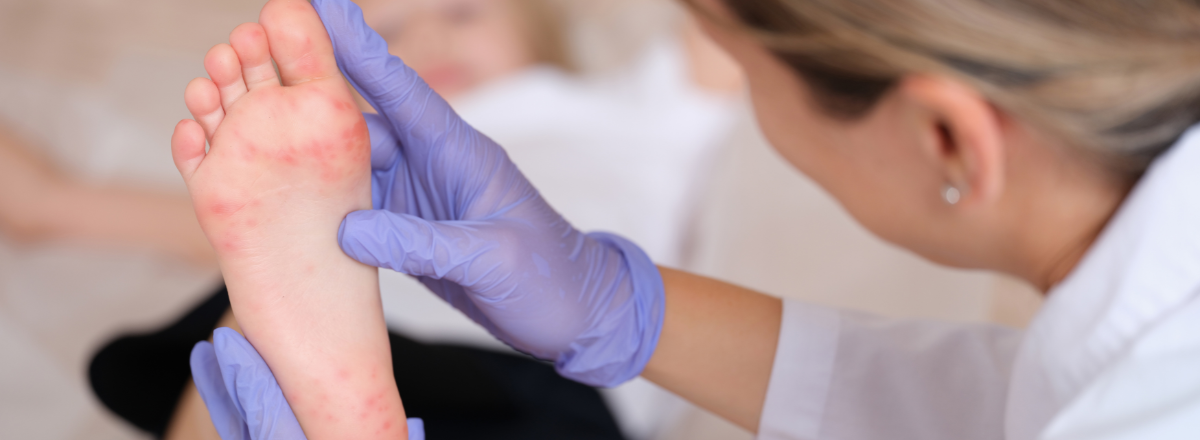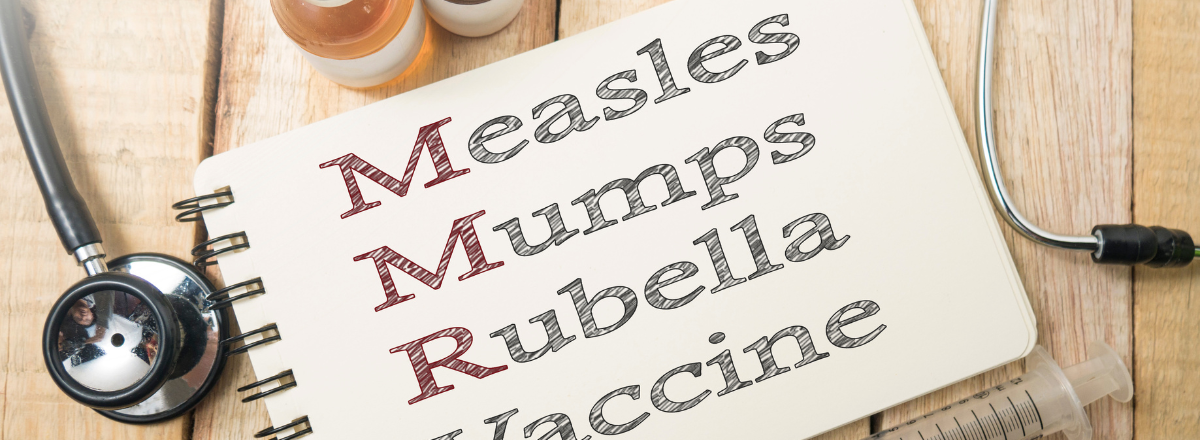Measles is back in the headlines for all the wrong reasons. Despite a safe and effective MMR vaccination programme in place, current uptake is lower than it has ever been and measles cases are once again climbing at an alarming rate.
So much so, the UK Health and Security Agency (UKHSA) has declared a national incident in a bid to raise awareness of the dangers and complications of measles – and the importance and ease of getting vaccinated against it. Not only does this offer 99% protection against measles, it also offers high protection against mumps and rubella – both unpleasant diseases, too.
‘As well as protecting you against this potentially deadly disease, getting vaccinated also stops the virus being able to spread and protects others who may not be able to get vaccinated due to illness or severe allergies,’ says ZoomDoc GP Dr Lydia Williamson.
With millions of children currently unvaccinated against it, the UKHSA is launching a catch-up campaign urging parents to take measles seriously and to come forward and make a vaccination appointment with their GP.
Here’s what you need to know about the current measles outbreak and why vaccination is the best protection against it – for you and for others, too.
Measles outbreak: what’s the latest?

Measles can spread very easily among those who are unvaccinated, especially in nurseries and schools.
The number of cases of measles last year made headlines but not even a month into 2024 official data shows a concerning number of cases already.
Since October (2023) there have been 216 confirmed diagnoses of measles and 103 probable. In the whole of 2022 there were a total of 54 cases so numbers are considerably higher and expected to rise further.
The UK Health and Security Agency (UKHSA) is urging all those who aren’t immunised and protected against measles to get vaccinated via pop-ups, local GPs or according to instructions sent out by text or letter.
NHS England estimates that for every child who catches measles, 1 in 5 will need hospital treatment.
‘Measles is more than just the rash it’s known for,’ says Dr Lydia. ‘It can make children very unwell and some will suffer life-changing complications as a result.’
What’s causing the measles outbreak?

There was an “alarming” nearly 45-fold increase in measles cases in Europe last year, the World Health Organization (WHO) says.
The MMR vaccine (offering measles, mumps and rubella in one combined jab) was introduced nearly 30 years ago and is offered as part of the NHS Routine Childhood Immunisation Programme. It is given in two doses around the age of 1 and again at the age of 3 years 4 months. The MMR Vaccine is the best way to protect yourself against measles and will also help to protect others who may be vulnerable or unable to have the vaccine for medical reasons.
However, to eradicate measles requires a 95% uptake in MMR vaccination. Currently in the UK, uptake is below 90% for the first dose and at 86% for the second dose. This means the virus, which is incredibly contagious, is able to spread easily amongst those who are unvaccinated, particularly in nurseries and schools.
‘The more unvaccinated people there are, the easier and faster any virus spreads – and measles is no different,’ says Dr Lydia.
‘Just to get an idea of how contagious measles is, one person with the virus can infect between 12 and 18 unprotected people,’ she adds.
Health officials are therefore urging anyone who hasn’t had one or both of their MMR vaccines to have it as soon as possible.
‘It’s never too late to get your vaccination if you’ve forgotten or not got round to it. And with measles cases spreading, now is the time to get your MMR, to protect yourself and others,’ says Dr Lydia.
Read more about children’s vaccines.
MMR vaccine: is it safe?
False claims linking the MMR jab to autism in 1997 put many people off having the jab and still causes vaccine hesitancy to this day. However, it’s important to remember the research was discredited and the doctor, who published it, was struck off.
General vaccine hesitancy fuelled by fake news and online misinformation also doesn’t help but there is plenty of research showing the safety and efficacy data for the MMR vaccine.
The NHS states:
‘There’s no evidence of any link between the MMR vaccine and autism. There are many studies that have investigated this.’ (Find these here).
Added to which, the National Autistic Society says:
‘There is no link between autism and vaccines. Much research has been devoted to this issue over the years and the results have comprehensively shown there is no link.’
NHS England data shows that more than 3.4million children under the age of 16 are currently unvaccinated against measles. If your child is one of them, or you’ve never had yours, don’t delay. Call your GP today to arrange it and be sure to get fully protected with both doses, not just one.
Dr Gayatri Amirthalingam, UK Health Security Agency Consultant Medical Epidemiologist says:
‘We now have a very real risk of measles outbreaks across the country. Please don’t put this off, check now that your children are fully up to date with both their MMR jabs and all their routine vaccines, and do take up the offer as soon as possible if you are contacted by your GP practice or the NHS for your child to catch up.’
Measles: what are the signs, symptoms and complications?

Symptoms of measles develop around 10 days after you’re infected. These can include: cold like symptoms; high temperature, spots in ones mouth, aches and pains.
There are a number of signs and symptoms to keep an eye out for when it comes to measles. Parents and family members should also be aware of complications that may occur as a result of measles.
Measles Signs and Symptoms
Measles is a highly unpleasant and infectious viral illness which can lead to serious complications. Anyone can get measles if they haven’t been vaccinated, although it’s most common in young children.
Symptoms typically occur 10 days after the person is exposed to the virus. The illness usually resolves itself after 7–10 days.
According to the NHS, symptoms of measles include:
- cold-like symptoms (temperature, runny or blocked nose, cough, sneezing, sore eyes
- small white spots inside the cheeks and on the back of the lips
- a rash that appears a few days after the cold-like symptoms.
‘A measles rash is very distinctive,’ says Dr Lydia.
‘It’s red and either raised or joined together to form blotchy patches. It is not usually itchy and often starts on the face, behind the ears and then spreads on to the body,’ she says.
Measles can cause complications, which can be serious and even fatal. These can include:
- pneumonia
- meningitis
- blindness
- seizures (fits)
‘It can also cause complications during pregnancy, such as miscarriage, stillbirth or premature birth so make sure you are vaccinated if you’re thinking of starting a family,’ says Dr Lydia.
What should you do if you suspect that you or your child has measles?
You should contact your GP as soon as possible if you suspect measles. As measles is highly infectious, it’s best to telephone a GP, to reduce the spread of infection.
You should also speak to a GP if you have been in close contact with someone who has measles, especially if you haven’t been fully vaccinated against measles or if you haven’t had the infection before. You should still contact your GP even if you don’t have any symptoms.
‘If you do need to see a doctor about symptoms, call your GP first as it is very contagious and they may prefer to do a phone appointment or home visit,’ says Dr Lydia.
Alternatively, you can make an appointment with a ZoomDoc GP at a time that suits you. Simply download the ZoomDoc app to speak to a doctor for just £35.
How long does measles take to recover from?
Most cases of measles will get better within a week, but you must try to stop the spread of infection to others.
To prevent the virus from spreading, you should stay off work, school, or nursery for at least 4 days from when the rash first appears. You should also try and avoid contact with people who may be more susceptible to infection, such as pregnant women, elderly and young children.
You can also help to prevent the spread of infection by washing your hands regularly with soap and water. Furthermore, you should use a tissue to cover your mouth and nose when coughing or sneezing and throw it straight into the bin.
How can you prevent measles?
As mentioned above, the best way to prevent measles is by vaccination with the MMR vaccine.
If you are not sure if your child is fully vaccinated against MMR, you can check if their vaccinations are up-to-date with your GP surgery.
To be fully vaccinated against measles your child should have received 2 doses of the MMR vaccine. The MMR vaccine is offered to all children as part of the NHS Childhood vaccination programme – the first dose is given around 13 months old, and a second dose is given at 3 years and 4 months.
Adults and older children can be vaccinated at any age if they haven’t been fully vaccinated before. If you are unsure if you were vaccinated in the past, having the vaccine again won’t do any harm.
For further information on measles see NHS choices.
Sick notes for measles
If measles keeps you off work or university for more than 7 calendar days, you may need a sick note for your employer/education setting. ZoomDoc makes that easy, too – just select the medical letter you need and you’ll get it same-day for just £45, no need to make an appointment with your doctor.

